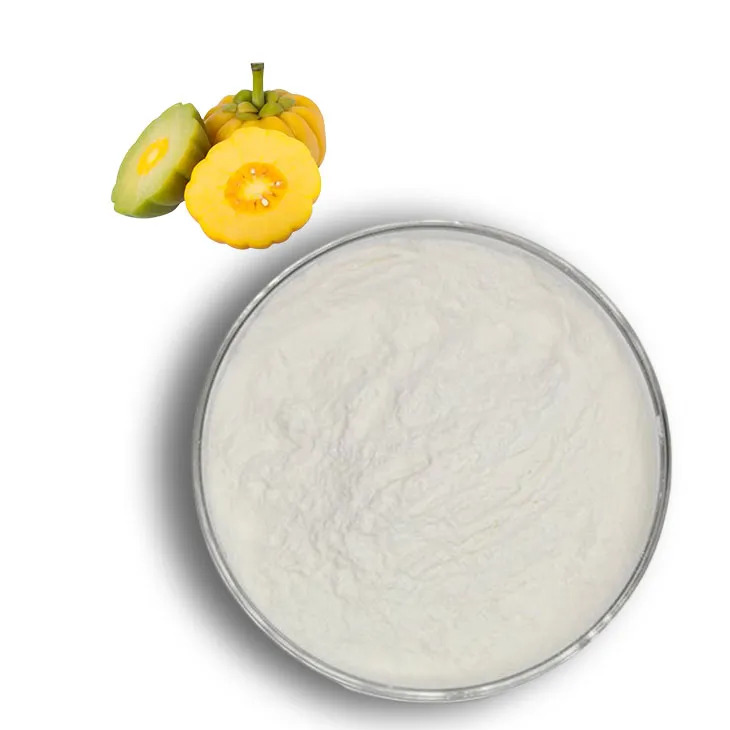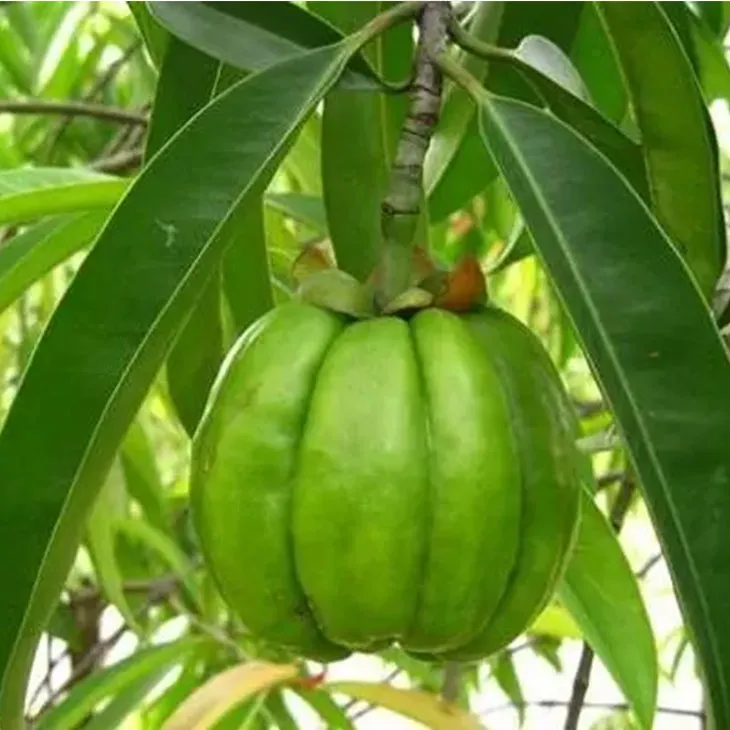- 0086-571-85302990
- sales@greenskybio.com
4 Things Consumers and Manufacturers Should Know about Garcinia Cambogia Extract
2024-12-10

Efficacy of Garcinia Cambogia Extract
1. Weight Loss Potential Garcinia Cambogia Extract has been widely promoted for its potential role in weight loss. One of the key components in the extract is hydroxycitric acid (HCA). HCA is believed to work by inhibiting an enzyme called citrate lyase, which is involved in the body's fat - production process. By blocking this enzyme, it is thought that the body may be less likely to store excess calories as fat. However, while some studies have shown promising results in terms of weight loss, the evidence is not entirely conclusive.
- Some clinical trials have reported that participants taking Garcinia Cambogia Extract experienced a modest reduction in body weight compared to those in the control group. For example, in a study where participants were on a reduced - calorie diet and also taking the extract, they showed a slightly greater weight loss over a period of several weeks.
- On the other hand, many other studies have failed to demonstrate a significant and consistent effect on weight loss. There are factors such as differences in study design, dosage of the extract used, and the overall lifestyle and diet of the participants that can influence the results.
2. Appetite Suppression Another aspect of the efficacy of garcinia cambogia extract is its potential to suppress appetite. HCA may interact with the body's serotonin levels. Serotonin is a neurotransmitter that plays a role in regulating mood and appetite. By increasing serotonin levels, it is hypothesized that the extract can make a person feel fuller for longer periods, thereby reducing overall food intake.
- In some animal studies, there have been indications that garcinia cambogia extract can lead to a decrease in food consumption. However, translating these results to humans is not always straightforward, as human physiology and eating behaviors are more complex.
- In human studies related to appetite suppression, the results have been mixed. Some participants reported feeling less hungry while taking the extract, but others did not notice any significant change in their appetite.

Safety Considerations of Garcinia Cambogia Extract
1. Potential Side Effects While garcinia cambogia extract is often marketed as a natural supplement, it is not without potential side effects.
- Gastrointestinal Issues: One of the most commonly reported side effects is gastrointestinal discomfort. This can include symptoms such as nausea, vomiting, diarrhea, and abdominal pain. These symptoms may occur due to the extract's effect on the digestive system or an individual's sensitivity to the components in the extract.
- Headaches: Some users have also reported experiencing headaches while taking garcinia cambogia extract. The exact cause of these headaches is not fully understood, but it could be related to changes in neurotransmitter levels or other physiological effects of the extract.
- Liver Toxicity Concerns: There have been some concerns regarding the potential for liver toxicity associated with garcinia cambogia extract. Although the evidence is not conclusive, some case reports have suggested a possible link between the use of the extract and liver damage. However, it is important to note that in many of these cases, other factors such as pre - existing liver conditions or the use of other medications or supplements may have also been involved.
2. Interaction with Medications Garcinia cambogia extract can interact with certain medications, which is an important safety consideration.
- Antidepressants: Since the extract may affect serotonin levels, there is a potential for interaction with antidepressant medications that also target serotonin. Combining garcinia cambogia extract with these medications could lead to an excessive increase in serotonin levels, which can cause a condition known as serotonin syndrome. Symptoms of serotonin syndrome can include confusion, rapid heart rate, high blood pressure, and in severe cases, it can be life - threatening.
- Diabetes Medications: For individuals with diabetes who are taking medications to control their blood sugar levels, garcinia cambogia extract may interact with these drugs. There is a possibility that the extract could affect blood sugar regulation, either by increasing or decreasing blood sugar levels, which could disrupt the effectiveness of diabetes medications.

Sourcing of Garcinia Cambogia Extract
1. Geographic Origin Garcinia cambogia is native to Southeast Asia, particularly countries like India and Indonesia. The quality of the extract can be influenced by its geographic origin.
- Soil and Climate Conditions: In its native regions, the plant thrives in specific soil and climate conditions. For example, the soil in certain parts of India may contain unique minerals and nutrients that contribute to the growth and chemical composition of the garcinia cambogia fruit. Areas with a warm and humid climate are also favorable for the growth of the plant, and these environmental factors can affect the concentration and quality of the active ingredients in the fruit.
- Wild - Harvested vs. Cultivated: The source of the garcinia cambogia can be either wild - harvested or cultivated. Wild - harvested plants may have different characteristics compared to those that are cultivated. While wild - harvested plants may be considered more "natural," there are also concerns regarding over - harvesting and the potential impact on the local ecosystem. Cultivated plants, on the other hand, can be more closely monitored for quality and safety, but they may require the use of pesticides and fertilizers, which need to be carefully regulated to ensure that they do not contaminate the final extract.
2. Quality Control in Sourcing Ensuring high - quality sourcing of garcinia cambogia extract is crucial for both consumers and manufacturers.
- Certifications: Manufacturers should look for suppliers that have relevant certifications, such as Good Agricultural Practice (GAP) and Good Manufacturing Practice (GMP). These certifications indicate that the plants are grown and the extract is produced under strict quality and safety standards. For example, GAP - certified farms follow proper agricultural techniques to ensure the healthy growth of the garcinia cambogia plants, while GMP - certified facilities adhere to strict manufacturing processes to prevent contamination and ensure product consistency.
- Testing for Purity: Regular testing for purity is essential. This includes testing for the presence of contaminants such as heavy metals, pesticides, and other harmful substances. High - quality extracts should be free from these contaminants to ensure consumer safety. Additionally, testing for the accurate concentration of active ingredients, such as HCA, is necessary to ensure that the product contains the claimed amount of beneficial components.

Regulatory Compliance for Garcinia Cambogia Extract
1. Regulatory Status in Different Countries The regulatory status of garcinia cambogia extract varies from country to country.
- United States: In the United States, garcinia cambogia extract is classified as a dietary supplement. This means that it is regulated under the Dietary Supplement Health and Education Act (DSHEA). However, the regulations for dietary supplements are not as strict as those for pharmaceuticals. Manufacturers are responsible for ensuring the safety of their products, but the pre - market approval process is less rigorous compared to drugs.
- European Union: In the European Union, the regulation of garcinia cambogia extract is more complex. It is subject to the EU's food supplement regulations, which require strict labeling, including information on ingredients, dosage, and potential allergens. Additionally, there are safety requirements and limits on the use of certain substances in food supplements.
- Other Countries: In many other countries, the regulatory approach may be similar to either the US or the EU, or it may have its own unique set of regulations based on the country's healthcare and consumer protection policies. For example, in some Asian countries where garcinia cambogia is native, there may be traditional use regulations or specific requirements for the import and export of the extract.
2. Importance of Adhering to Regulations For manufacturers, adhering to regulatory requirements is of utmost importance.
- Consumer Protection: Regulatory compliance helps to protect consumers from potential harm. By following the rules regarding safety, labeling, and quality control, manufacturers can ensure that the products they produce are safe and accurately represented to the public. This is especially important given the potential side effects and interactions associated with garcinia cambogia extract.
- Business Reputation: Complying with regulations also helps to maintain a good business reputation. Manufacturers that are known for following the rules are more likely to be trusted by consumers and regulatory authorities. This can lead to increased customer loyalty and a positive image in the market, which is beneficial for long - term business success.
- Legal Consequences of Non - Compliance: Failure to adhere to regulatory requirements can have serious legal consequences. In some cases, manufacturers may face fines, product recalls, or even legal action if their products are found to be non - compliant. These consequences can be costly and damaging to the business, both financially and in terms of reputation.

FAQ:
Question 1: What is Garcinia Cambogia Extract?
Garcinia Cambogia Extract is a substance derived from the rind of the Garcinia Cambogia fruit. It has gained popularity for its potential use in weight management, among other possible benefits.
Question 2: Is Garcinia Cambogia Extract effective for weight loss?
Research on its effectiveness for weight loss is somewhat mixed. Some studies suggest that it may have a modest effect on reducing appetite and increasing fat burning. However, it is not a magic solution, and its impact can vary from person to person. Other factors such as diet and exercise also play crucial roles in any weight - loss regimen.
Question 3: Is Garcinia Cambogia Extract safe to consume?
When taken in appropriate doses, it is generally considered safe for most healthy adults. However, some people may experience side effects such as digestive issues, headaches, or insomnia. Pregnant or breastfeeding women, as well as those with certain medical conditions, should avoid using it without consulting a healthcare provider.
Question 4: How can manufacturers ensure the quality of Garcinia Cambogia Extract?
Manufacturers should focus on proper sourcing from reliable suppliers. They need to ensure that the raw materials are pure and free from contaminants. Quality control measures during the extraction and manufacturing processes are also essential. This includes testing for potency, purity, and ensuring compliance with relevant industry standards.
Question 5: What are the regulatory requirements for Garcinia Cambogia Extract?
Regulatory requirements vary by country. In some regions, it may be classified as a dietary supplement, which has specific labeling, manufacturing, and marketing regulations. Manufacturers must ensure that they adhere to these regulations, which often include providing accurate information about the product's ingredients, dosage, and potential side effects.
Question 6: Can Garcinia Cambogia Extract interact with medications?
Yes, it can potentially interact with certain medications. For example, it may interfere with medications for diabetes or high blood pressure. Therefore, individuals taking any medications should consult their doctor before using Garcinia Cambogia Extract to avoid any adverse interactions.
Related literature
- The Efficacy and Safety of Garcinia Cambogia Extract in Weight Management"
- "Sourcing and Quality Control of Garcinia Cambogia Extract: A Manufacturer's Guide"
- "Regulatory Landscape of Dietary Supplements: Focus on Garcinia Cambogia Extract"
- ▶ Hesperidin
- ▶ Citrus Bioflavonoids
- ▶ Plant Extract
- ▶ lycopene
- ▶ Diosmin
- ▶ Grape seed extract
- ▶ Sea buckthorn Juice Powder
- ▶ Fruit Juice Powder
- ▶ Hops Extract
- ▶ Artichoke Extract
- ▶ Mushroom extract
- ▶ Astaxanthin
- ▶ Green Tea Extract
- ▶ Curcumin
- ▶ Horse Chestnut Extract
- ▶ Other Product
- ▶ Boswellia Serrata Extract
- ▶ Resveratrol
- ▶ Marigold Extract
- ▶ Grape Leaf Extract
- ▶ New Product
- ▶ Aminolevulinic acid
- ▶ Cranberry Extract
- ▶ Red Yeast Rice
- ▶ Red Wine Extract
-
Sea buckthorn Juice Powder
2024-12-10
-
Resveratrol extract
2024-12-10
-
Licorice Root Extract Powder
2024-12-10
-
Andrographis Paniculata Extract Powder
2024-12-10
-
Mulberry leaf Extract
2024-12-10
-
Citrus Aurantium Extract
2024-12-10
-
Citrus bioflavonoids
2024-12-10
-
Pueraria Lobata Extract
2024-12-10
-
Hedyotis Diffusa Extract
2024-12-10
-
White Willow Bark Extract
2024-12-10





















